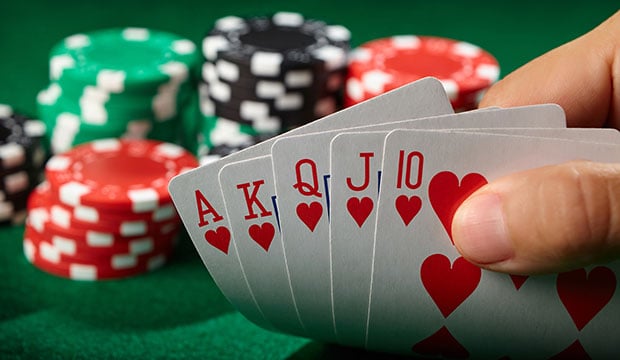Poker stands as one of the most renowned card games globally, known for its simplicity yet notorious for the challenge it presents in mastering it professionally. Unlike games reliant solely on chance, poker demands strategy and skill from players to make informed decisions. While there exist numerous variations of poker, this article win tips bet focuses on elucidating the most common form of poker gameplay. >> Check out more on laptop/PC.
What is Poker?
Poker, also known as Texas Hold'em, is a widely popular card game found in international casinos and even domestic online soccer betting site. It represents a variant of the standard 52-card deck. Today, poker has evolved into internationally recognized competitions such as the APPT, APR, or WSOP, attracting a growing number of enthusiasts seeking the thrill of the game.
In Vietnam, poker is referred to as "xì tố" or "xì phé." It also employs a standard 52-card deck. In each round of poker, players are dealt a certain number of cards individually, with additional community cards revealed. Subsequent betting rounds follow, with players wagering based on their hand and strategic considerations. Ultimately, remaining players reveal their hands to determine the winner. Poker embodies the fusion of gambling, strategy, and a multitude of other skills.
Poker Terminology
Fold: Declining to continue in the current round and forfeiting the hand. Example: If you have a poor hand and no chance of winning.
Bet: Initially wagering an amount. If you are the first to act, others must match your bet to continue playing.
Raise: Increasing the bet after a previous player's wager. A raise indicates a strong hand.
All-in: Betting or raising all of one's chips or money. If the game continues after going all-in, the remaining action involves watching. The winnings are based on the pot's size at the time of going all-in.
Call: Matching the current bet to continue playing.
Basic Rules of Poker
A poker table typically accommodates 2-10 players, although online poker platforms may vary in table size. Each table features a designated dealer position ("D"), which rotates clockwise after each hand. Players receive two hole cards initially, followed by five community cards dealt face-up on the table. A poker hand comprises four betting rounds: pre-flop, flop, turn, and river.

After four rounds, the player with the strongest hand, combining their hole cards and the community cards, wins the pot. Some hands may end prematurely if all players but one fold, in which case, the remaining player claims the pot uncontested.
Detailed Gameplay
Round 1: Pre-Flop
The first betting round occurs once players receive their two hole cards. The player to the left of the dealer initiates the betting. Players can choose to call, raise, fold, or check.
Round 2: Flop
Three community cards are dealt face-up on the table. Players can use these cards in combination with their hole cards to form the best possible hand. Betting resumes, starting with the player to the left of the dealer.
Round 3: Turn
The fourth community card (the turn) is dealt face-up. Players continue betting as in previous rounds.
Round 4: River
The fifth and final community card (the river) is dealt face-up. After a final betting round, remaining players reveal their hands in a showdown to determine the winner based on hand rankings.
Comprehensive Guide to Poker for Beginners!
Introduction: Poker stands as one of the most renowned card games globally, known for its simplicity yet notorious for the challenge it presents in mastering it professionally. Unlike games reliant solely on chance, poker demands strategy and skill from players to make informed decisions. While there exist numerous variations of poker, this article focuses on elucidating the most common form of poker gameplay. >> Check out more on laptop/PC.
What is Poker?
Poker, also known as Texas Hold'em, is a widely popular card game found in international casinos and even domestic online gambling platforms. It represents a variant of the standard 52-card deck. Today, poker has evolved into internationally recognized competitions such as the APPT, APR, or WSOP, attracting a growing number of enthusiasts seeking the thrill of the game.
In Vietnam, poker is referred to as "xì tố" or "xì phé." It also employs a standard 52-card deck. In each round of poker, players are dealt a certain number of cards individually, with additional community cards revealed. Subsequent betting rounds follow, with players wagering based on their hand and strategic considerations. Ultimately, remaining players reveal their hands to determine the winner. Poker embodies the fusion of gambling, strategy, and a multitude of other skills.
Poker Terminology
Fold: Declining to continue in the current round and forfeiting the hand. Example: If you have a poor hand and no chance of winning.
Bet: Initially wagering an amount. If you are the first to act, others must match your bet to continue playing.
Raise: Increasing the bet after a previous player's wager. A raise indicates a strong hand.
All-in: Betting or raising all of one's chips or money. If the game continues after going all-in, the remaining action involves watching. The winnings are based on the pot's size at the time of going all-in.
Call: Matching the current bet to continue playing.
Basic Rules of Poker
A poker table typically accommodates 2-10 players, although online poker platforms may vary in table size. Each table features a designated dealer position ("D"), which rotates clockwise after each hand. Players receive two hole cards initially, followed by five community cards dealt face-up on the table. A poker hand comprises four betting rounds: pre-flop, flop, turn, and river.
After four rounds, the player with the strongest hand, combining their hole cards and the community cards, wins the pot. Some hands may end prematurely if all players but one fold, in which case, the remaining player claims the pot uncontested.
Detailed Gameplay
Round 1: Pre-Flop
The first betting round occurs once players receive their two hole cards. The player to the left of the dealer initiates the betting. Players can choose to call, raise, fold, or check.
Round 2: Flop
Three community cards are dealt face-up on the table. Players can use these cards in combination with their hole cards to form the best possible hand. Betting resumes, starting with the player to the left of the dealer.
Round 3: Turn
The fourth community card (the turn) is dealt face-up. Players continue betting as malaysia top betting sites in previous rounds.
Round 4: River
The fifth and final community card (the river) is dealt face-up. After a final betting round, remaining players reveal their hands in a showdown to determine the winner based on hand rankings.
Conclusion
Through this article, we've introduced the fundamental rules of poker. It is our hope that this information will serve as a helpful guide for newcomers to this fascinating discipline.


